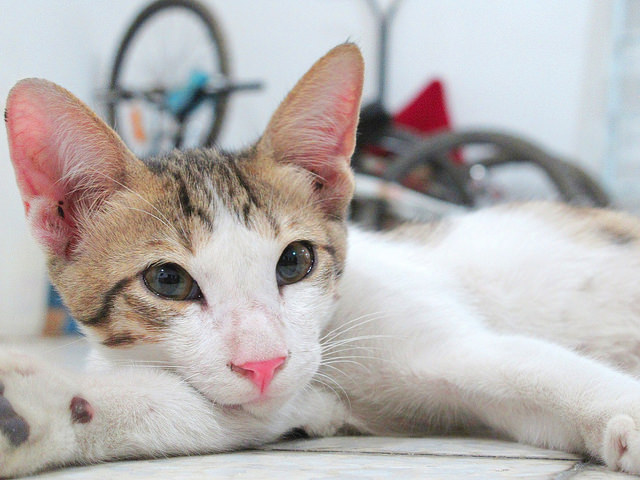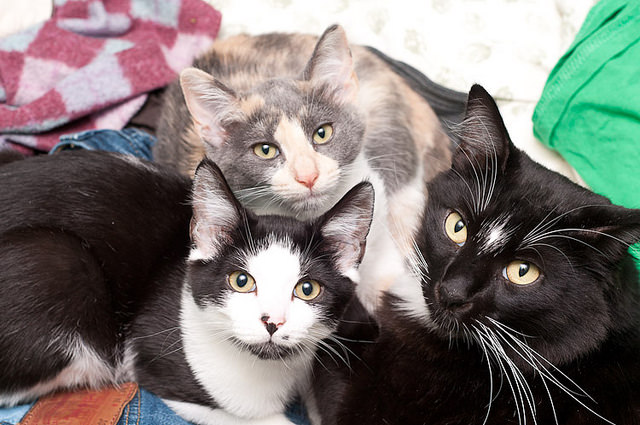It may seem counterintuitive to promote fostering rather than adopting. After all, isn’t adoption the happy endgame? Well, yes. But that doesn’t have to be your role in it.
There are a variety of reasons why you may not be able to make the long-term commitment involved in adopting a cat. Perhaps you are a student or a member of the military. Maybe you know you’ll be moving across the country in a year. If you can’t reasonably predict the stability of your future, you’re right not to adopt. But perhaps you can make a significant difference by provide a great temporary home.
Rescue organizations across the country are desperate for caring homes to take the stress off of overloaded shelters. Your temporary home may help save lives!

Image Source: Martie Swart via Flickr.com
1. Fostering is more flexible
When you commit to fostering a cat or kittens you are generally only committing to a few weeks to a few months. You get to step in for a few weeks of snuggles, then pass her off to her new family.
Many organizations are also in need of more long-term foster homes for cats who don’t do well in the shelter environment, chronically ill cats who need extra love and care, or cats who are recovering from surgeries or medical issues. A long-term foster care situation may be a great option for someone who can’t commit for the long haul but can commit for six months or a year.

Image Source: Mohammed Mustafa via Flickr.com
2. You can test the waters
Fostering is a great way to test the waters if you are considering adopting a cat but haven’t lived with a cat before and don’t know what to expect. Caring for a cat for a few weeks or months can give you a good look into what kinds of emotional, financial, and time commitments you’d be signing up for.
Plus, if you decide that adoption is right for you and you fall in love with your foster cat you can always adopt her!

Image Source: James Dean via Flickr.com
3. Some animals can’t live in a shelter environment
Fostering gives a chance at life to many animals who can’t live or thrive in shelter environments. There are many reasons a cat may require a foster home. Here are some (but not all) examples:
- If a cat is very shy or skittish she will do better in a home rather than a shelter that can overwhelm her.
- An extra-territorial cat can be a danger to himself or others in an environment with so many other cats to compete with, but can be a total sweetheart in a less threatening home environment.
- A cat who is recovering from surgery, illness, or other medical issue will heal more efficiently in an environment that is less stressful. A healing cat will also do better if he has more individualized attention and care than he’d get in a shelter.
- Pregnant cats need safe, clean, stress-free environments to give birth in. After birth, she will also need several weeks in a quiet and safe space to nurse and care for her babies until they are old enough to be adopted.
- Kittens have fragile immune systems and need more constant care than they could receive at a shelter. All kittens require foster homes and cannot live in a typical shelter environment.

Image Source: triforce_goddess64 via Flickr.com
4. Most shelters will cover all medical expenses
Your side of the financial commitment will be minimal while you are fostering. Most organizations work with an extensive network of veterinarians and will cover any medical expenses the cat may need while in your care. Some organizations may even cover basic day to day living expenses like food and litter (but don’t count on that).

Image Source: Amber Dubya via Flickr.com
5. You’ll help so many more animals
When the cats you are caring for are temporary it gives you a chance to befriend and care for so many more! Just think: instead of saving and adopting one cat, you could help save four or five cats (or more!) a year.

Image Source: Mark Vitazko via Flickr.com
6. You can teach valuable lessons to your children (and yourself, too!)
Whether you are an adult or child, fostering can teach you a lot. It can teach children about the value of helping someone in need and how to be gentle. Maybe most importantly, it can teach the importance of helping for the sake of helping, without the long-term benefits gleaned from adopting. There’s something special that can come from teaching a child to be proud of the short-term care and role they will play in preparing the cat for a new home and family.

Image Source: Sue Tupling via Flickr.com
7. You may get to help choose the future “furever” family
As a foster parent, you have a unique look into a cat’s specific personality, temperament, and quirks. By the time your foster cat is ready to be adopted, you will know her better than anyone else and you will know what kind of environment she is most likely to thrive in. For this reason, many organizations will give foster parents veto power if they feel a potential adopter isn’t suitable for their foster cat.
If you are fostering kittens, many organizations will also take your opinions into consideration if two are particularly bonded and you believe they should be adopted together rather than be separated.

Image Source: Jarosław Pocztarski via Flickr.com
8. You will save lives
Shelters all over the country are overflowing with cats and many are being turned away or euthanized because there simply isn’t enough room. Opening your home to a foster cat will give a second chance to a cat in need while also opening up the resources to allow the organization to rescue more cats.

